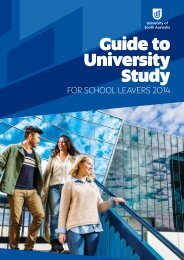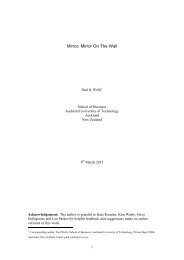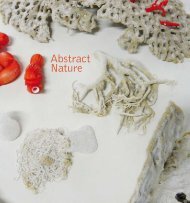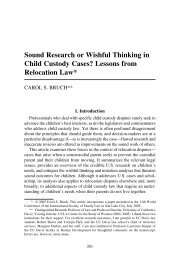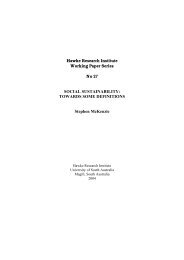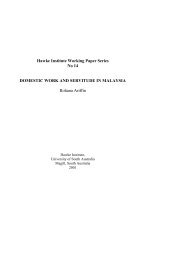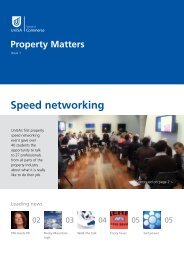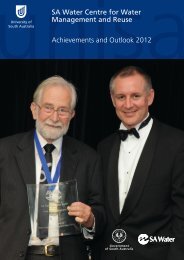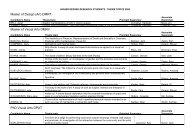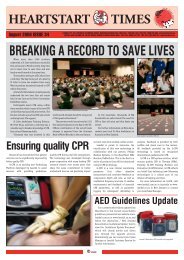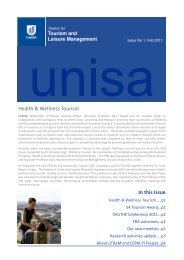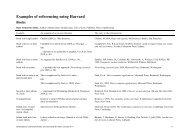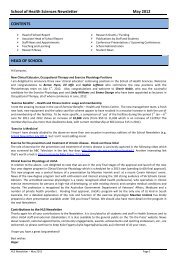Digest #5 - University of South Australia
Digest #5 - University of South Australia
Digest #5 - University of South Australia
Create successful ePaper yourself
Turn your PDF publications into a flip-book with our unique Google optimized e-Paper software.
2<br />
Some Questions with Raj Banerjee<br />
Dr Rajabrata Banerjee joined the School <strong>of</strong> Commerce in February<br />
2011 as Lecturer in Economics. Raj completed a BSc in Economics<br />
at the <strong>University</strong> <strong>of</strong> Calcutta and an MA in Economics at Jadaypur<br />
<strong>University</strong> before completing his PhD at Monash <strong>University</strong> in 2011.<br />
While still a postgraduate student he received extremely high<br />
teaching evaluation scores and we are delighted that he has joined<br />
our Centre. We asked him a few questions about his past inspirations<br />
and plans for future research.<br />
What is on your research agenda for the next three years?<br />
In the next three years, I plan to look at endogenous growth and<br />
international knowledge spillovers with a special focus on developed<br />
and emerging economies, such as India and China. Other areas <strong>of</strong><br />
interest are the nexus between population growth and knowledge<br />
production for take-<strong>of</strong>fs by economies since the early eighteenth<br />
century and the Great Divergence, and the relative importance <strong>of</strong><br />
sectoral productivity growth and its sources, as well as a comparison<br />
<strong>of</strong> productivity and sources <strong>of</strong> growth in advanced and developing<br />
economies.<br />
What publication and which author has been the most<br />
influential on your work?<br />
It is really hard to name one publication or author that is most<br />
influential in life. Research adds new ideas and builds on existing<br />
pools <strong>of</strong> knowledge and also helps a researcher to re-think a problem<br />
more deeply. In my case, if I have to name any publications, they<br />
would be Endogenous Growth Theory by P. Aghion and P. Howitt,<br />
published in 1998 by The MIT Press, and ‘Semi-endogenous versus<br />
Schumpeterian growth models: Testing the knowledge production<br />
function using international data’ by J.B. Madsen (Journal <strong>of</strong><br />
Economic Growth, 2008, Vol.13 no.1).<br />
Why did you come to the <strong>University</strong> <strong>of</strong> <strong>South</strong> <strong>Australia</strong> and<br />
what do you like about it and living in Adelaide?<br />
To build a successful career after completion <strong>of</strong> a doctoral degree is<br />
the dream <strong>of</strong> every academic. Right now, UniSA is relatively young<br />
and aspires to build a reputation fast. Associating with such an<br />
organisation gives me the opportunity to be a part <strong>of</strong> a strong team<br />
and will help me to build my reputation in the long run.<br />
In addition, balancing pr<strong>of</strong>essional and personal life is important for<br />
everyone. My aim was to join an institution where there is freedom<br />
to enjoy what I do and how I develop my thoughts.<br />
Finally, Adelaide is a very happening city – the centre <strong>of</strong> the festival<br />
state. The people are pleasant and helpful and, most importantly, the<br />
weather is better than in other cities.<br />
What has been your most significant award or<br />
career highlight to date?<br />
Publishing a chapter from my PhD dissertation in an<br />
ERA ranked A* journal and achieving very strong<br />
teaching evaluation scores from a class <strong>of</strong> 400 students,<br />
which I coordinated on my own during my PhD career.<br />
The evaluation report highlighted my presentation and<br />
conceptual skills, which were higher than the overall<br />
average <strong>of</strong> the department at Monash.<br />
What do you enjoy most about academic life?<br />
I think all academics enjoy the flexibility <strong>of</strong> time and the<br />
freedom <strong>of</strong> doing research in their own areas, and I am<br />
not an exception to that. I believe that if you love your<br />
pr<strong>of</strong>ession, you can love your life.<br />
What made you decide to study Economics in your<br />
university career?<br />
This is a very difficult question because it asks<br />
something about what happened almost ten years ago<br />
and does not reflect much <strong>of</strong> my present thinking about<br />
Economics as a subject. It would be incorrect to claim<br />
that I chose Economics because I loved the subject or<br />
I found it interesting! In a world <strong>of</strong> competition and<br />
choosing one’s future, there were far more important<br />
things that concerned my parents and me after I<br />
finished high school than deciding on a study focus.<br />
How do you balance your teaching and research<br />
interests?<br />
I have passion for both research and teaching, and<br />
when you have passion for more than one thing it is<br />
always difficult to manage your time. When both are in<br />
the same area, it is easier to integrate them. The best<br />
way to answer this would be to say that I maximise my<br />
interests subject to a time constraint.



